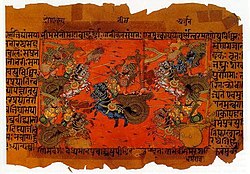William Dalrymple (historian)
The section Amshavatara Parva (1.7.a) of the Adi Parva in the Mahabharata (Critical Edition). provides a detailed account of the incarnations of Danavas, Asuras, gods, and other celestial beings into human forms, as narrated by Vaisampayana to Janamejaya, revealing the divine origins of prominent figures in the epic.[1][2]
| Asuras | Human Incarnation |
|---|---|
| Viprachitti (Danava) | Jarasandha |
| Hiranyakashipu (son of Diti) | Shishupala |
| Samhrada (younger brother of Prahlada) | Shalya (king of the Bahlika) |
| Anuhrada (youngest of the brothers) | Dhrishtaketu (king) |
| Sibi (son of Diti) | Druma (king) |
| Baskala (Asura) | Bhagadatta (king) |
| Ayashiras, Ashvashiras, Ayashanku, Gaganamurdhan, Vegavat | 5 kings of the Kekayas |
| Ketumat (Asura) | Amitaujas (king) |
| Svarbhanu (Asura) | Ugrasena (king) |
| Ashva (Asura) | Ashoka (king) |
| Ashvapati (brother of Ashva) | Hardikya (king) |
| Vrishaparvan (Asura) | Dirghaprajna (king) |
| Ajaka (brother of Vrishaparvan) | Malla (king) |
| Ashvagriva (Asura) | Rocamana (king) |
| Sukshma (Asura) | Brihanta (king) |
| Tuhunda (Asura) | Senabindu (king) |
| Ishtva (Asura) | Papajit (king) |
| Ekacakra (Asura) | Prativindhya (king) |
| Virupaksha (Asura) | Citravarman (king) |
| Hara (Danava) | Suvastu (king) |
| Ahara (Asura) | Bahlika (king) |
| Nicandra (Asura) | Munjakesha (king) |
| Nikumbha (Asura) | Devadhipa (king) |
| Surabha (son of Diti) | Paurava (king) |
| Shalabha (Asura) | Prahlada (Bahlika king) |
| Candra (son of Diti) | Rishika (royal seer) |
| Mritapa (Asura) | Pashcimanupaka (king) |
| Gavishtha (Asura) | Drumasena (king) |
| Mayura (Asura) | King of the land Vishva |
| Suparna (brother of Mayura) | Kalakirti (king) |
| Candrahantri (Asura) | Sunaka (royal seer) |
| Candravinashana (Asura) | Janaki (royal seer) |
| Dirghajihva (Danava) | Kashiraja (king) |
| Kratha (son of Sirphi) | Parvateya (king) |
| Vasumitra (son of Anayus) | Vikshara (king) |
| Second brother of Vasumitra (Asura) | King of the Pamsu realm |
| Balavira (Asura) | Paundramatsyaka (king) |
| Vritra (Asura) | Manimat (king-seer) |
| Krodhahantri (Asura) | Danda (king) |
| Krodhavardhana (Asura) | Dandadhara (king) |
| Kaleyas (Eight Sons of Kalaka) | Jayatsena (king of the Magadhas), Aparajita (king), King of the Nishadas, Shrenimat (royal seer), Mahaujas (king), Abhiru (royal seer), Samudrasena (king), Brihat (king) |
| Krodhavasa group | Kings: Nandika, Karnaveshta, Siddhartha, Kitika, Suvira, Subahu, Mahavira |
| Divine Beings | Human incarnation |
| Devaka | Chief lord of the Gandharvas |
| Brihaspati (seer of the Gods) | Drona (son of Bharadvaja) |
| United portions of Mahadeva, Yama, Kama, Krodha | Ashwatthaman |
| Eight Vasus | Sons of Shantanu by Ganga (youngest: Bhishma) |
| Rudras | Kripa |
| Dvapara | Shakuni |
| Maruts | Satyaki, Drupada, Kritavarma, Virata |
| Gandharva king | Hamsa (son of Arishta) |
| Kali (malicious diety of Strife) | Duryodhana |
| Various Rakshasas | Duryodhana’s brothers (Kauravas, from Dushasana onward: Durmukha, Duhshaha, etc.) |
| Dharma (god of Justice)[note 1] | Yudhishthira |
| Vayu (god of Wind) | Bhimasena |
| Indra (King of gods) | Arjuna |
| Ashvins (twin-gods) | Nakula and Sahadeva (twins) |
| Varchas | Abhimanyu |
| Agni (god of Fire) | Dhrishtadyumna |
| A Rakshasa | Shikhandi |
| Vishvadevas | Upapandavas (Draupadi’s five sons) |
| Surya (god of Sun) | Karna |
| Narayana (Vishnu) | Krishna |
| Shesha | Balarama |
| Sanatkumara | Pradyumna |
| Apsaras | Sixteen thousand junior wives of Krishna |
| Shri (goddess of Prosperity)[note 2] | Draupadi |
| Siddhi (goddess of Success) | Kunti |
| Dhriti (goddess of Endurance) | Madri |
| Mati (goddess of Wisdom) | Gandhari |
Notes
- ^ The Northern Recension (NR) also includes Vidura as an incarnation of Dharma in the list.
- ^ The Northern Recension (NR), however, assigns Shri to Rukmini and reinterprets Draupadi as Shachi, likely due to her marriage to Arjuna. Scholars view this shift (Adi Parva, Section LXVII, NR) as a later interpolation, rejecting Shri's association with Rukmini in the Critical Edition of the Mahabharata.[3][2]
References
- ^ Buitenen, Johannes Adrianus Bernardus; Fitzgerald, James L. (1973). The Mahābhārata. University of Chicago Press. pp. 151–154. ISBN 978-0-226-84663-7.
- ^ a b Brodbeck, Simon; Black, Brian (9 August 2007). Gender and Narrative in the Mahabharata. Routledge. ISBN 978-1-134-11995-0.
- ^ Hiltebeitel, Alf (1 January 2017). The Ritual of Battle: Krsna in the Mahabharata. Motilal Banarsidass. p. 62. ISBN 978-81-208-4034-8.

 Read
Read
 AUTHORPÆDIA is hosted by Authorpædia Foundation, Inc. a U.S. non-profit organization.
AUTHORPÆDIA is hosted by Authorpædia Foundation, Inc. a U.S. non-profit organization.
